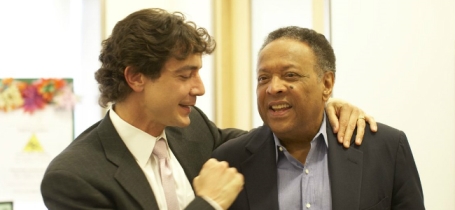Anchorman Uncovers Lung Cancer
John Johnson, 72, never thought that he could have lung cancer. But on October 31, 2006 an article in The New York Times — featuring radiologist Dr. Claudia Henschke and her work detecting early stage lung cancer with low-dose CT scans — made him pause. He considered his exposure to radiation while covering Three Mile Island and the first Iraq War in his career as a senior correspondent with leading New York television news stations. He was also a former smoker having quit 10 years prior after smoking on and off for 30 years. To put his mind at ease he made an appointment for a low-dose CT (Computed Tomography) scan with Dr. Henschke at the Lung Screening Program.
Getting Treated
 The results of the CT scan indicated that he had a small, suspicious spot in his right upper lobe. Mr. Johnson went to one doctor who thought that the lesion was inflammatory. Seeking a second opinion, he sought out cardiothoracic surgeon, Dr. Raja Flores, who felt that it was not inflammatory but that it could be cancer. Dr. Flores recommended that Mr. Johnson undergo surgery, and at the time of surgery, it was confirmed that Mr. Johnson did indeed have lung cancer. As a result, a lobe of his right lung was removed. "I was shocked," said Mr. Johnson of being told that he had cancer, "just shocked, I never thought that I would have cancer."
The results of the CT scan indicated that he had a small, suspicious spot in his right upper lobe. Mr. Johnson went to one doctor who thought that the lesion was inflammatory. Seeking a second opinion, he sought out cardiothoracic surgeon, Dr. Raja Flores, who felt that it was not inflammatory but that it could be cancer. Dr. Flores recommended that Mr. Johnson undergo surgery, and at the time of surgery, it was confirmed that Mr. Johnson did indeed have lung cancer. As a result, a lobe of his right lung was removed. "I was shocked," said Mr. Johnson of being told that he had cancer, "just shocked, I never thought that I would have cancer."
Cancer Free
Mr. Johnson credits Dr. Henschke and Dr. Flores with not only saving his life, but also giving him the quality of life that he has today. "This cancer was caught at the very earliest stage," he remarked. "I didn’t have to have chemotherapy, I didn’t need radiation - it was taken out."
Four years later, Mr. Johnson is cancer free.
Although he had yearly checkups with x-rays of his lungs, his cancer went undetected. "Had I not done this," he says of the CT scan, "I think that I would have clearly been in the same boat as my colleague, Peter Jennings."
His Advice for Others
"Had I not had a CT scan I would not be sitting here, cancer free," says Mr. Johnson. He recommends to anyone who has smoked or been exposed to pollutants to have a CT scan, "it may save your life."